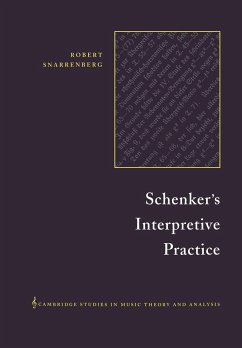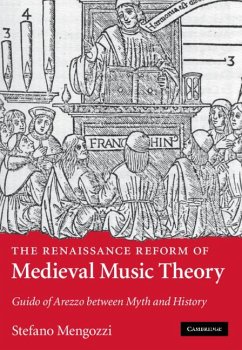
Schenker's Argument and the Claims of Music Theory

PAYBACK Punkte
23 °P sammeln!
This book provides a reassessment of the work of Heinrich Schenker.Heinrich Schenker's theoretical and analytical works claim to resubstantiate the unique artistic presence of the canonic work, and thus reject those musical disciplines such as psychoacoustics and systematic musicology which derive from the natural sciences. In this respect his writing reflects the counter-positivism endemic to the German academic discourse of the first decades of the twentieth century. The rhetoric of this stance, however, conceals a sophisticated programme wherein Schenker situates his project in relation to ...
This book provides a reassessment of the work of Heinrich Schenker.
Heinrich Schenker's theoretical and analytical works claim to resubstantiate the unique artistic presence of the canonic work, and thus reject those musical disciplines such as psychoacoustics and systematic musicology which derive from the natural sciences. In this respect his writing reflects the counter-positivism endemic to the German academic discourse of the first decades of the twentieth century. The rhetoric of this stance, however, conceals a sophisticated programme wherein Schenker situates his project in relation to these sciences, arguing his reading of the musical text as a synthesis of a descriptive psychology and an explanatory historiography (which itself embeds both paleographic and philological assumptions). This book rereads Schenker's project as an attempt to reconstruct music theory as a discipline against the background of the empirical musical sciences of the later nineteenth century.
Review quote:
"...distinguished by an extremely impressive breadth of research."
Journal of Aesthetics and Art Criticism
Table of contents:
Foreword Ian Bent; Preface; Part I. The Appeal to Psychology: 1. A new program for music theory; 2. The psychologistic argument; 3. The contrapuntal laboratory; 4. An epistemological crisis and a plausible solution; 5. A descriptive and analytic psychology; Part II. The Historiological Imperative: 6. The authority of history; 7. The improvisational imagination, editing, execution; 8. The interior performance; 9. The paleographic argument; 10. The philological paradigm; Part III. The Objective Synthesis: 11. The coordination of discourses; 12. System and synthesis; 13. Closure; 14. Representation; 15. A priori and a posteriori theories; 16. Two polemics; 17. The function of ideology; Bibliography; Indexes.
Heinrich Schenker's theoretical and analytical works claim to resubstantiate the unique artistic presence of the canonic work, and thus reject those musical disciplines such as psychoacoustics and systematic musicology which derive from the natural sciences. In this respect his writing reflects the counter-positivism endemic to the German academic discourse of the first decades of the twentieth century. The rhetoric of this stance, however, conceals a sophisticated programme wherein Schenker situates his project in relation to these sciences, arguing his reading of the musical text as a synthesis of a descriptive psychology and an explanatory historiography (which itself embeds both paleographic and philological assumptions). This book rereads Schenker's project as an attempt to reconstruct music theory as a discipline against the background of the empirical musical sciences of the later nineteenth century.
Review quote:
"...distinguished by an extremely impressive breadth of research."
Journal of Aesthetics and Art Criticism
Table of contents:
Foreword Ian Bent; Preface; Part I. The Appeal to Psychology: 1. A new program for music theory; 2. The psychologistic argument; 3. The contrapuntal laboratory; 4. An epistemological crisis and a plausible solution; 5. A descriptive and analytic psychology; Part II. The Historiological Imperative: 6. The authority of history; 7. The improvisational imagination, editing, execution; 8. The interior performance; 9. The paleographic argument; 10. The philological paradigm; Part III. The Objective Synthesis: 11. The coordination of discourses; 12. System and synthesis; 13. Closure; 14. Representation; 15. A priori and a posteriori theories; 16. Two polemics; 17. The function of ideology; Bibliography; Indexes.














